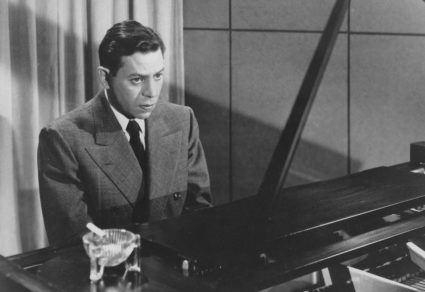
Authorities had issued an arrest warrant for Busfield over allegations of misconduct from when he was working as a director…

When my eldest daughter was just a little girl–4 years old to be exact–we embarked on a project we called "Musical School." Every Sunday afternoon, I introduced her to some of the greatest movie musicals ever made. As time went on, we watched many more films that were not so great but, nonetheless, worth screening for the sake of thoroughness. Over the years, however, I never had a good response for a question that first came up while watching the MGM masterpiece, "An American in Paris" (and again while sitting through "The Band Wagon" and "The Barkleys of Broadway"):
"Daddy, what's an Oscar Levant?"
On this day, the 49th anniversary of his death, it is a fitting time to answer that question. Born in Pittsburgh in 1906, Oscar Levant was the child of Russian Jewish immigrants, a piano prodigy, and a difficult boy to discipline. The multi-talented man eventually found success as a concert pianist; serious composer; popular songsmith; best-selling author; friend, self-designated mourner and chief interpreter of George Gershwin's "Rhapsody in Blue," the "Second Rhapsody," and the "Piano Concerto in E;" panelist on radio and television shows like "Information Please"; and a grumpy curmudgeon in 13 major motion pictures, always playing the same second-banana role of…Oscar Levant.
READ MORE: George Gershwin's too-short life ended on a blue note
On film and in real life, he was never very far from a piano. Some have said that, had Levant only devoted himself to the keyboard, expanding both his repertoire and technique, he might have rivaled Vladimir Horowitz or Arthur Rubinstein, but he hated practicing for eight or more hours a day. He detested concertizing because of excessive stage fright, and had all sorts of superstitious rituals he observed before each performance. When he finally did get out there to tickle the ivories, the results were remarkable. During the 1940s, he was the highest paid–and easily the most temperamental–classical musician in the United States.
Levant possessed an encyclopedic mind, even if the subjects he commanded didn't always seem to be alphabetized. He knew almost everything about classical and popular music, baseball, and movies and a long list of books. Such erudition made him the perfect guest on the quiz shows of the day. He was also incredibly musically attuned and could name the composer of pieces merely by listening to the first note of each composition. Long before the term multitasking was coined, Levant was often photographed noodling out classical tunes on the piano, while simultaneously chain-smoking cigarettes and drinking too many cups of coffee, reading movie scripts, and writing a letter.
Then there was also his Howitzer of a wit. No one, it seemed, was quicker with a comeback, and everyone had their favorite Levant line — probably because there was always a ring of truth to every joke he ever made. (This was, after all, the man who once declared, "I knew Doris Day before she was a virgin.") I must confess I am partial to his response to what he did for exercise. Levant famously groused, "I stumble and then I fall into a coma!"
Between 1963 and 1964, after a lifetime of psychic peaks and valleys, Levant sat for a series of interviews on Jack Paar's "Tonight Show." Levant frankly discussed his mental breakdowns, his multiple institutionalizations in psychiatric hospitals, electroshock therapy and episodes of mania and depression. He revealed that his famous "nervousness" was only relieved by taking drugs that rendered him unconscious, resulting in his addiction to barbiturate sleeping pills and opiate painkillers. While writing what became his best-selling book, "The Memoirs of an Amnesiac," Levant confessed that there were too many lacunae in his tortured brain to accomplish the task: "I don't have a page filled."
In 1963, Paar introduced Levant with what today would be considered a rather unfunny and barbed witticism: "To put it mildly, he is as nervous as he is clever. For every pearl that goes out of his mouth, a pill goes in." Paar was careful to reassure his audience that his guest enjoyed being there, saying "it is a form of therapy for him."
On what would have been his 100th birthday, in 2006, NPR memorialized him as "Hollywood's First Celebrity Meltdown." In today's socially mediated 24/7 news cycle, it is difficult to imagine just how taboo the topic of prescription opiate addiction was back then, let alone how much courage it took for Levant to bring it to such national prominence.
For most of his life, Levant considered himself to be a failure of Herculean proportions. His maelstrom of neuroses, quirks and tics were inspired by a stern, cold father and an impossible-to-please mother, a series of music teachers who were less than generous with their praise, and a gigantic inferiority complex, along with several traumatic life episodes including the lopsided friendship and death of Gershwin.
The result was that Levant was unable to hear the gales of laughter and applause that consistently came his way. Poor Oscar could only focus on his failings rather than enjoy his many accomplishments. He had many talents but he had a hard time focusing on which one to truly master. Without getting too technical, he was a sitting duck for mental health problems.
I think I finally found an answer to my daughter's question in the 1946 film "Humoresque," in which Oscar played a supporting role to other stars. In a tart throwaway line, Levant described the essence of being Oscar: "It isn't what you are, it's what you don't become that hurts."
Sustain our coverage of culture, arts and literature.